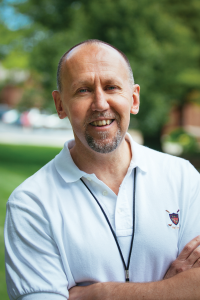
For many professionals interested in earning a graduate degree, moving to Virginia to study full-time for two years at the Center for Justice and Peacebuilding isn’t possible. Recognizing this, CJP now offers a limited residency program for the MA program.
“Full residency is still the preferred option, when possible, because it allows for a deeper level of community building,” said Jayne Docherty, academic programs director. “But this option enables practitioners and others interested in gaining new skills and knowledge to join us while honoring their other commitments.”
That was the case for Gregory Winship, training and office manager at the Center for Conflict Resolution (CCR) in Kansas City, Missouri. He had the support of CCR’s executive director Annette Lantz-Simmons, MA ’09*, who also was urging Winship’s colleague Debbie Bayless to attend EMU. But he couldn’t leave his organization for two years.
Winship’s work with CCR includes sites such as prisons, schools, communities and the criminal justice system. “For me, the restorative justice training was an important piece of what CJP offered. At CCR, we think that restorative justice, conflict resolutions, and trauma awareness and resilience are the trifecta of what people need. Those concepts cover life skills … whatever context a person is in, knowledge of those three concepts helps immensely.”
If all goes as planned, Winship will be the first to graduate within the limited residency format, earning an MA in restorative justice in May 2017. He will have accomplished this by attending the Summer Peacebuilding Institute (SPI) for two consecutive summers, taking online courses, fulfilling a one- semester residency requirement, and completing the practicum requirement at his workplace. (Winship is also earning a graduate certificate in non-profit leadership and social entrepreneurship, coursework that included a few extra online classes.)
Winship says his spring 2016 residency provided opportunities to develop friendships and networks among current students and faculty he’d met at SPI and online, and “get a better picture for the mission and values of EMU and CJP.” Faculty and staff have been welcoming and supportive, as he transitioned into the academic community and juggled responsibilities at CCR (he telecommuted 10 hours a week during the semester).
The residency also provided unique learning and practice opportunities for Winship, an experienced trainer. He led workshops within Virginia Mennonite Conference, facilitated meetings in a local community, hosted a seminar series at a transitional residential home for ex-offenders, accompanied an undergraduate class to Graterford Prison, and joined other students in lobbying for sentencing reform with Friends Committee on National Legislation.
The presence of experienced professionals in classes benefits the CJP community as much as it does the individual, says Docherty. “Our discussions about case studies are more realistic. Working professionals often share workplace skills with less experienced students. The work/school balance can be difficult for these students, but they also find the extended time in Harrisonburg helpful for reflection and reorienting their career goals or plans for future work.”
There have been plenty of challenging times, Winship says, but a key factor has always been the relevance to his work, and lately, too, the exciting possibilities in the field itself.
“Restorative justice is operable in so many venues, and a lot of those places are becoming RJ-friendly. I can see this degree opening up a lot of new possibilities in the field.”